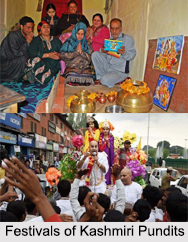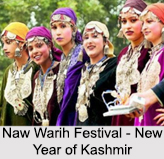 Festivals of Kashmiri Pundits are many in number. Religious festivals of Kashmiri Pundits are in keeping with the various religious ceremonies and events that are followed by the people of the state.
Festivals of Kashmiri Pundits are many in number. Religious festivals of Kashmiri Pundits are in keeping with the various religious ceremonies and events that are followed by the people of the state.
Different Festivals of Kashmiri Pundits
The most important festivals of the Kashmiri Pundits are as follows:
Shivaratri: It commences from the first day of the dark fortnight of Phalgun (February-March). From the 5th to the 9th day, house-cleaning and washing of the clothes is done. On the 10th day, money is sent to the daughters according to the customary scale. On the 11th day, fried fish and bread are cooked in the house and after a brief ceremony the whole family partakes of the food. On the 13th day, the head of the family needs a fast and performs the puja of Lord Shiva during the night. The 14th day is the feast day. The elders are given presents of sugar or fruit by the younger ones, and cooked rice and meat are sent to the daughters. On the 15th day or first day of the succeeding fortnight, walnuts consecrated at the puja are distributed among relations and friends.
Jeth Ashtami: Jeth Ashtami, the 8th day of the bright fortnight of Jeth (May-June), is sacred as it is held to be the birthday of the Goddess Ragnia. On this day, a fair is held at the sacred spring situated at the village of Tulumula. Thousands of people gather here and spend the night praying and singing around the spring. 
Har Nawami: Har Nawami or the 9th day of the bright fortnight of Har (June-July) is the birthday of the Goddess Sharika whose shrine is situated on the Hari Parvat hill in Srinagar. From early morning onwards, thousands of people go round the sacred hill and also attend a big Havan performed in honour of the Goddess there.
Janmashtami: The birthday of Lord Krishna is celebrated on the 8th day of the dark fortnight of Bhadon (August-September) when every Kashmiri Pundit keeps a fast which is broken at moonrise. Presents of various fruits and cash are sent to daughters on this day.
Pun: Pun is a ceremony held in honour of the Goddess Lakshmi. Bread is prepared in each household on any auspicious day during the bright fortnight of Bhadon and, after performing the necessary religious rites, is distributed among relatives and neighbours.
Kambari Pak: Kambari Pak or the dark fortnight of Assuj (September-October) is entirely devoted to the Shraadh ceremonies. A Shraadh is performed in memory of the departed Pitris on the days corresponding to the Tithi of the day of his or her death.
Dussehra: Also known as Vijay Dashami, the 10th of the bright fortnight of Assuj is celebrated as the day of victory of Lord Rama over Ravana, Effigies of Ravana, Kumbhkarna and Meghnad are burned at sunset on this day. The ceremonies held are exactly similar to the ones held in the rest of India.
Among the other festivals celebrated by the Kashmiri Pundits are Sont, Naw Warih and Baisakhi.









